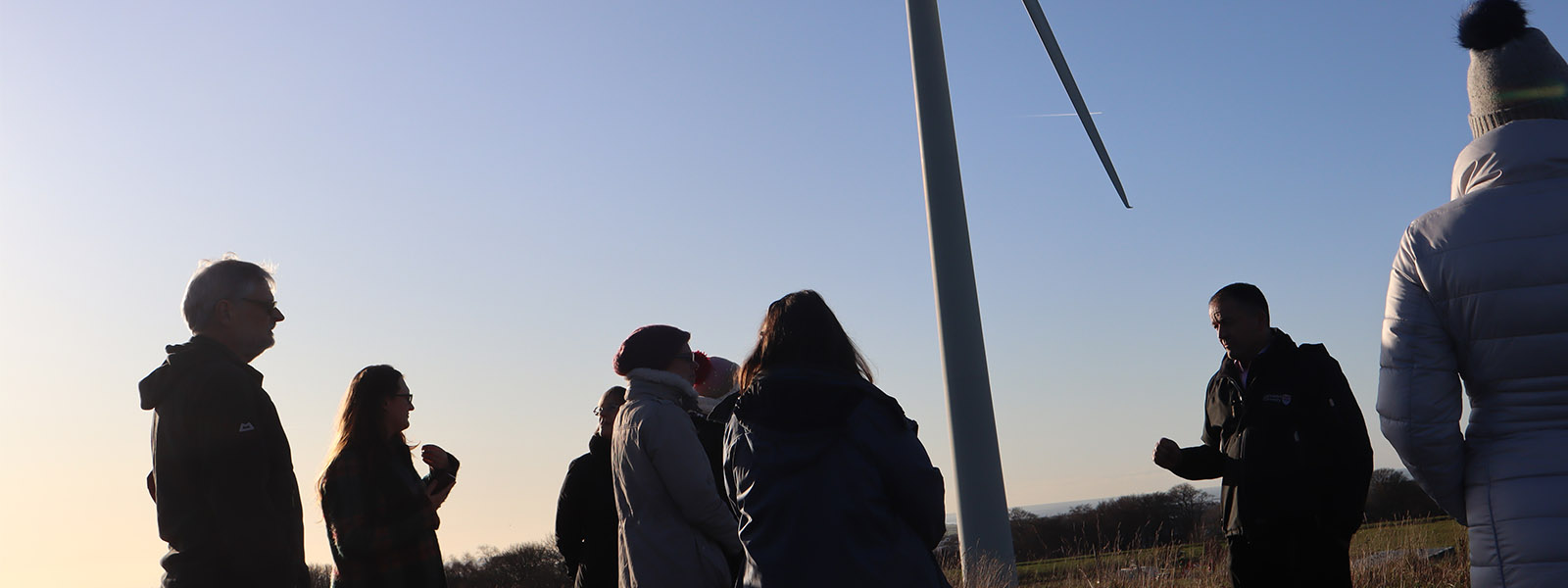
Community Benefit Fund
Giving back to the local community through the savings from our wind turbine
Scroll to content
The Community Benefits Fund awards local communities across the Lancaster District with grant funding for community-based and environmental projects.
The fund originated with the installation of the University's wind turbine in 2012. The wind turbine produces around 15% of the overall energy demand on campus each year and the Community Benefits Fund uses some of that benefit to engage with the local community and promote sustainable projects.
Each year, the fund allocates up to ?20,000 to Lancaster District-based not-for-profit organisations, charities, trusts, community groups or voluntary organisations to support sustainable projects, large and small. The funding really makes a difference to the local area, whether that's through funding new charging points for electric vehicles or contributing towards refurbishment projects to improve energy efficiency, the projects we fund vary in complexity and value.
Applications for the next round of funding are now open until Sunday 30 June 2024. Any Lancaster District-based trust, community group or voluntary organisation can apply to the fund.
Previous grant recipients
Each year great projects receive funding to help improve lives and the environment within the local community. Here's a look at some of the success stories over the years.

Heart of the City Project
?5000 was awarded to St Thomas Church in Lancaster towards replacing the existing church hall. Part of a wider ?2.5M Heart of the City Project, the application was well received by the Community Benefit Fund Steering Group and was the highest value awarded to a single applicant in round seven of applications.
The contribution saw the former hall replaced with a new, 77m2 multi-use community building with up graded lighting and heating to make the facilities more energy efficient. The new space also created two part-time posts and around 30 voluntary roles.

Sensory Garden Project
The partial ?1,000 grant enabled Piccadilly Garden to raise sufficient funds to purchase materials to construct a path, raised beds and seating areas as part of the sensory path project. Piccadilly Gardens provides a day support service for those with learning difficulties and mental health issues and plants (as well as operating as a garden centre and providing jobs for users). The sensory path was identified as having a range of benefits for users from a mental health perspective as well as a learning resource and ecological benefit in its own right.

Ellel Multi-Use Path Development
?6,800 awarded to Ellel Parish Council to deliver this project. Creating a new combined permissive footpath/cycle path linking the A6 opposite Hazelrigg lane with Highland Brow (road). The link enables pedestrians and cyclists to avoid using the busy A6 when travelling from the University towards Galgate.

Lighting Up Project
Lancaster Boys & Girls Club was awarded a grant of ?1,947.9 to install replacement energy efficient LED lighting in the club offices and reception area. The installation reduced electricity consumption by 35% and increased bulb life by 30%.

Solar Panels for Local Clubhouse
The community Benefit Fund provided a grant of ?4,850 to enable solar PV panels to be installed on the roof of Quernmore Recreation Club. The 16Kw system generates approximately 3,000 kwh/annum of electricity, significantly reducing club carbon emissions and enabling the club to offer use of the facility free to the local primary school.

Dino Day - Lancaster BID
Lancaster BID was awarded ?2,500 to help deliver a dinosaur themed fun day in Lancaster City Centre. The day included giant animatronic dinosaurs and other themed activities for the local community and was designed to encourage the local community to visit and appreciate Lancaster City Centre. The project engaged with local partners such as the museum and library and highlighted the city’s link with the famous local palaeontologist Sir Richard Owen.

A Growing Success
The grant of ?1,000 (in addition to funding from other providers) enabled the Claver Hill Group to implement a project install an additional poly tunnel and compost tunnel at the site. The Claver Hill site is a community food growing site located adjacent to relatively deprived parts of east Lancaster and the facility provides access to affordable local fruit and veg and provides education and training opportunities for local people and schools.

Lancaster Green Spaces
The Hedge laying project enabled 20 volunteers on two days to learn the skills required to lay hedges. Two local trainers instructed the volunteers with guidance from LCC Countryside service. The grant of ?831.64 paid for trainer costs and equipment.



